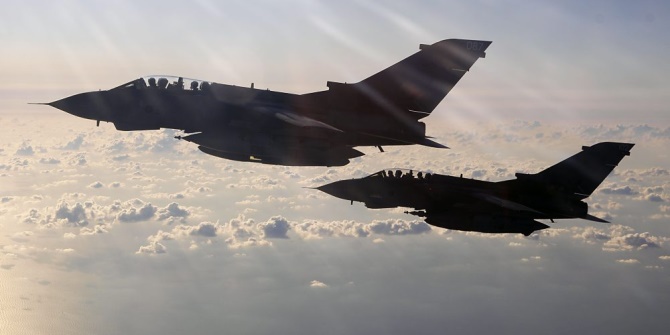 The UK parliament has authorised military action against ISIL militants in Iraq (but not Syria) in a vote that cut across party lines. James Strong examines the significance of the vote, writing that in military terms, the vote was mostly insignificant as Britain will contribute just six Tornado jets to fighting in Iraq. It was far more significant from a political perspective, with Cameron having to make concessions to get Miliband on board.
The UK parliament has authorised military action against ISIL militants in Iraq (but not Syria) in a vote that cut across party lines. James Strong examines the significance of the vote, writing that in military terms, the vote was mostly insignificant as Britain will contribute just six Tornado jets to fighting in Iraq. It was far more significant from a political perspective, with Cameron having to make concessions to get Miliband on board.
Tonight’s parliamentary vote in favour of military action in Iraq said more about British politics than British foreign policy. It was more significant from a British political perspective than it will be for the campaign against ISIL as a whole.
David Cameron has regained a measure of foreign policy credibility after his humiliation over Syria last year. Ed Miliband has shown he can put party politics aside in the service of the national interest. Both men will go into the next general election equally bound by the decision once again to take military action in Iraq.
Cameron ensured success by securing Miliband’s support. Last year he was accused of rushing things. He failed to consult his party or to get Labour on board. He was unable to win a majority without them. There is a strong isolationist tendency within the Conservative Party. There is an equally strong pacifist tendency within Labour. Together these forces ensure bipartisan opposition to any military action. With parliamentary politics so finely balanced, the only way this government can win support is if it wins bipartisan support. That was why the agreement between the two leaders proved so crucial. As I have written for this blog before, over 75 per cent of MPs voted for either the government or the Labour proposals for Syria in August 2013. No-one voted for both, despite the fact they were almost identical. Had the leaders reconciled their views last year as they did this time round, we would have seen 75 per cent of MPs vote in favour of a path to intervention in Syria. This time we have seen a strong vote to support another round of action in Iraq.
Yet Cameron also had to make concessions to get Miliband on board. His decision to rule out using ground troops owed something to fears of parliamentary objections. It was also a strategic decision, based on the belief that this is a fight that regional forces ultimately must win themselves. Yet it certainly helped minimise the scope for Labour opposition. Cameron’s decision to restrict British action to fighting ISIL in Iraq and not across the border in Syria was more political. It is strategically eccentric to fight ISIL in one part of its territory and not in another. But that was Miliband’s price. Miliband sought to appear statesmanlike but not blocking military action entirely. But he sought also to distance himself from Cameron, and from Blair. Last year he did that by pushing for a greater UN role. Like Cameron, he miscalculated, and wound up derailing the entire policy of standing up to President Assad. This time around his ambitions were more modest, and they were fulfilled. Britain will take no action in Syria. It will limit its operations to Iraq.
Both Cameron and Miliband seemed to leave open the prospect of revisiting the restriction to Syria. Cameron made clear he believed there was a strong case for action on both sides of the border. Miliband said only that it would be better to gain UN Security Council approval first. But in reality it seems unlikely parliament will ever consider that particular extension. Public opinion appears nonplussed about the distinction between fighting ISIL in Iraq and fighting ISIL in Syria. There is a better legal case for action now than there was a year ago. But the politics would be too difficult. Miliband has chosen Syria as his point of differentiation. He would struggle to back down without some clear external stimulus, such as a UN vote, and that seems unlikely. Cameron, meanwhile, knowing that he could not win a parliamentary vote without Miliband, will not risk defeat in the months remaining before the next election.
In military terms, tonight’s vote was mostly insignificant. Britain will contribute just six Tornado jets to fighting in Iraq. By contrast it sent sixteen Tornados and ten Typhoons to Libya in 2011. Its contribution is similar in size to those of smaller European states like the Netherlands and Belgium. The US in any event does not need allies to fight ISIL. It can comfortably handle the aerial portion of the campaign by itself.

In terms of the politics of the US-led coalition, by contrast, tonight’s vote was far more significant. The US gathers allies where it can. It is doing quite well on this occasion. But it always likes to have Britain on board. Britain has been the most reliable and most committed US ally since the end of the Cold War. It backed the invasion of Iraq when most US allies refused, and it has stayed the course in Afghanistan. If Britain was against this action it would raise serious domestic questions for President Obama. He was, after all, forced to abandon his own plans to strike against Assad when Britain pulled out. By the same token, British participation sends a very strong signal to Washington that the US will not have to win this fight alone. It also lends Britain credibility as it seeks to be part of the broader political and diplomatic processes in the region.
There may yet be domestic consequences for Britain. We cannot rule out retaliatory terror attacks at home. We will in time have to deal with as many as five hundred returning British jihadis. If there is a major attack, or a battlefield disaster, the consequences for the next election could still be profound. Labour supports military action. But UKIP stands resolutely and publicly opposed.
Neither the situation in Syria nor that in Iraq will have an ultimate military solution. These are political conflicts, and only through politics will they be resolved. As Ban Ki-Moon said recently, ‘missiles kill terrorists, but good governance kills terrorism’. It is only by getting the politics right that the West will bring stability to this benighted region, and actually it is only by getting the politics right themselves that the people of Iraq and Syria will achieve the stability, legitimacy and justice so many of them want.
Note: This article gives the views of the author, and not the position of the British Politics and Policy blog, nor of the London School of Economics. Please read our comments policy before posting. Featured image credit: UK Ministry of Defence CC BY-SA 2.0
 James Strong is a Fellow in Foreign Policy Analysis at the London School of Economics. His research looks at British foreign and security policy, the politics of the 2003 invasion of Iraq, and foreign policy communication. Twitter: @dr_james_strong.
James Strong is a Fellow in Foreign Policy Analysis at the London School of Economics. His research looks at British foreign and security policy, the politics of the 2003 invasion of Iraq, and foreign policy communication. Twitter: @dr_james_strong.








1 Comments